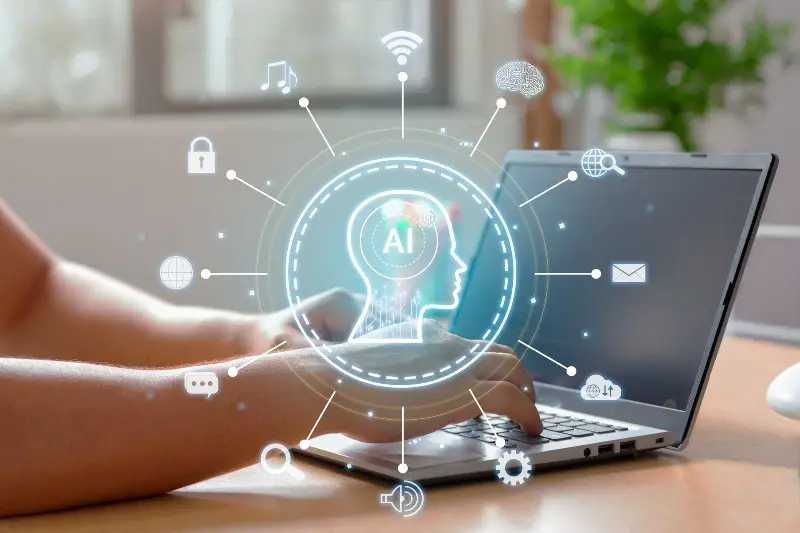In today’s world, where technology is advancing at a rapid pace, Black Box AI has become a term that’s both intriguing and slightly confusing for many. This blog post aims to break down the concept of Black Box AI into simpler terms, making it understandable for someone with the knowledge level of an eighth grader. The idea is to explore how this technology impacts various aspects of our lives, from healthcare to the future of work.
Black Box AI might sound like something out of a sci-fi movie, but it’s very much a part of our present and future. This technology involves artificial intelligence systems that are complex and not entirely understood by even those who create them. As we delve into this topic, we’ll also look at how Black Box AI interacts with other key areas such as healthcare, the general public, and robotics.
Healthcare
In healthcare, Black Box AI is making waves by helping doctors and researchers in ways that were once thought impossible. It can analyze vast amounts of medical data quickly, helping to diagnose diseases earlier and more accurately. This type of AI is like a super-smart assistant that can find patterns and connections in the data that humans might miss.
However, the use of Black Box AI in healthcare also brings challenges. Since it’s not always clear how AI reaches its conclusions, doctors may find it hard to trust its advice fully. They might wonder, “Why is the AI suggesting this treatment?” Understanding the reasoning behind these suggestions is as important as the suggestions themselves in medical decision-making.
General Public
For the general public, Black Box AI is both fascinating and a bit mysterious. Most of us interact with this kind of AI every day without even knowing it. When you get recommendations from a streaming service or see personalized ads online, that’s often Black Box AI at work. It’s learning from your choices and behaviors to make these suggestions.
But this also raises concerns about privacy and understanding. Many people are worried about how their data is used and whether these AI systems make fair decisions. For example, if an AI decides what news you see online, how do you know it’s showing you a balanced view? Questions like these are important as we rely more on AI in our daily lives.
Robotics
In the world of robotics, Black Box AI is playing a crucial role in making robots smarter and more capable. These robots can learn from their experiences and improve over time, making them incredibly useful in various fields, like manufacturing, space exploration, and even household chores.
Yet, as robots become more advanced, people start to worry if they will replace human jobs. Will a robot be doing your job in a few years? The truth is more complicated. While robots can do some tasks, they still need humans for guidance and decision-making. The relationship between humans and robots in the workplace is more about partnership than replacement.
Myths vs. Facts about Black Box AI
Myth: Black Box AI is Always Unreliable
Fact: While it’s true that the inner workings of Black Box AI are not fully transparent, these systems can be extremely accurate and reliable in certain tasks, especially those involving large data analysis.
Myth: Black Box AI is Dangerous
Fact: Black Box AI, like any technology, can pose risks if not used responsibly. However, it’s not inherently dangerous. The key is in how it’s developed, used, and regulated.
Myth: Black Box AI Will Replace All Human Jobs
Fact: Although AI and automation will change the nature of some jobs, it’s unlikely to replace all human work. Instead, AI will more likely complement human skills and create new types of jobs.
FAQ Section
Q1: What is Black Box AI?
Black Box AI refers to artificial intelligence systems whose internal workings are not easily understood by humans. These systems can process vast amounts of data and make decisions based on complex algorithms, but exactly how they do this is often unclear.
Q2: How does Black Box AI impact healthcare?
In healthcare, Black Box AI helps in diagnosing diseases, predicting patient outcomes, and personalizing treatment plans. However, the lack of transparency in decision-making can be a challenge for medical professionals who need to understand the reasoning behind AI’s suggestions.
Q3: Should the general public be concerned about Black Box AI?
The general public interacts with Black Box AI in many ways, often without realizing it. While it offers benefits like personalized services, concerns about data privacy and decision-making fairness are valid. It’s important for the public to be aware of how AI is used in the services they use.
Q4: What role does Black Box AI play in robotics?
Black Box AI is crucial in advancing robotics, allowing robots to learn from data and improve their functions. These advancements are transforming industries but also raise questions about the future of human-robot collaboration in the workforce.
Q5: Can Black Box AI be explained?
Efforts are being made to make Black Box AI more transparent and understandable. This involves developing new methods to interpret AI decisions and ensuring that AI systems can provide explanations for their actions.
Google Snippets
Snippet on Black Box AI
“Black Box AI refers to AI systems with inner workings that are not fully understood by humans, making complex decisions based on vast data analysis.”
Snippet on Healthcare AI
“AI in healthcare is revolutionizing the field by assisting in diagnosis, treatment planning, and patient care, though it raises questions about transparency and ethical use.”
Snippet on AI in Robotics
“AI-driven robotics is advancing rapidly, enhancing capabilities in various sectors, from industrial automation to personal assistance, while posing new challenges for workforce integration.”
Black Box AI Meaning: From Three Different Sources
Source 1
Black Box AI is a type of AI where the decision-making process is not transparent or understandable to humans, often involving complex algorithms.
Source 2
In Black Box AI, the exact process through which the AI system makes decisions is unclear, often due to the intricate nature of machine learning models and vast data analysis.
Source 3
Black Box AI refers to AI systems where the rationale behind decisions is not visible, making it challenging to understand why the AI behaves in a certain way, especially in complex scenarios.
Did You Know?
- Black Box AI is named so because, like an airplane’s black box, it’s difficult to understand what’s happening inside it.
- Some Black Box AI systems are so advanced that they create their own ‘language’ or methods to solve problems, which even their creators can’t understand.
- Efforts in AI research are increasingly focusing on developing ‘explainable AI’ that aims to make AI decision processes more transparent and understandable to humans.
Conclusion
Black Box AI is a fascinating yet complex aspect of modern technology, impacting many areas of our lives. From improving healthcare outcomes to transforming the way we interact with robots, this technology offers immense potential. However, the challenges it brings, particularly in terms of transparency and ethical considerations, cannot be overlooked. As we continue to explore and integrate AI into various sectors, understanding and demystifying Black Box AI becomes essential.
To truly benefit from the advancements of Black Box AI, we must balance innovation with responsibility. Ensuring that these AI systems are developed and used ethically, with a focus on transparency and human understanding, is crucial. As we step into a future where AI plays an even greater role, our journey with Black Box AI is just beginning, promising a world of possibilities and new discoveries.
References
- Explainable AI that uses counterfactual paths generated by conditional permutations of features. This method is used to measure feature importance by identifying sequential permutations of features that significantly alter the model’s output. The paper discusses the evaluation strategy of comparing the feature importance scores computed by explainers with the model-intern Gini impurity scores generated by the random forest, which is considered as ground truth in the study.
- Thinkful offers insights on how to address the “black box” problem in AI through Explainable AI (XAI) and transparency models. They discuss techniques like Feature Importance Analysis, Local Interpretable Model-agnostic Explanations (LIME), SHapley Additive exPlanations (SHAP), Model Distillation, and Decision Rules, which are designed to make AI models more interpretable and transparent. This is especially important in applications where decisions can have far-reaching consequences, such as healthcare or finance






